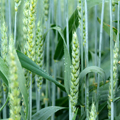Umweltforschung
TUM-Agrarwissenschaftler machen Nachhaltigkeit messbar
18.08.2009, Pressemitteilungen
Umweltaktivisten sprechen genauso gern von ihr wie Politiker, Ökonomen oder Marketingspezialisten - die „Nachhaltigkeit“ ist heute ein Modewort. Das Problem: Nachhaltigkeit ist ein Begriff, der für viele Dinge stehen kann und unterschiedliche Interpretationen zulässt. Agrarwissenschaftler der TU München bringen Licht ins Dunkel. Sie haben es mit Kollegen aus Wissenschaft und Praxis geschafft, die „Nachhaltigkeit“ im Agrarbereich zu konkretisieren. Mit ihrer Hilfe ist der facettenreiche Begriff messbar geworden – zum Vorteil von Landwirten, Lebensmittelherstellern und Verbrauchern.
Nicht auf Kosten der Umwelt und nachfolgender Generationen zu leben, sondern bei der Nutzung von Ressourcen auf das Gleichgewicht von Nehmen und Nachwachsen zu achten - das ist eine Kernidee des Nachhaltigkeitskonzepts. Es stammt ursprünglich aus der Forstwirtschaft und lässt sich auf eine Grundregel reduzieren: Schlage im Wald nie mehr Holz, als nachwachsen kann. Heute ist die Nachhaltigkeitsidee in allen Wirtschaftszweigen bedeutsam, doch die Tücke liegt in der Umsetzung: „Regenerierbare Systeme sind in der Regel sehr komplex. Landwirte, die ihren Betrieb nachhaltig führen wollen, brauchen fundierte Entscheidungsgrundlagen“, so Prof. Kurt-Jürgen Hülsbergen vom Lehrstuhl für Ökologischen Landbau und Pflanzenbausysteme der Technischen Universität München (TUM).
Die Forschungsfrage: Wie kann man den Nachhaltigkeitsstatus der Höfe mit verfügbaren Betriebsdaten ermitteln und gezielt verbessern? Das Ziel war hoch gesteckt - es ging darum, die Umweltbilanz landwirtschaftlicher Betriebe zu verbessern, ohne dabei deren Wirtschaftlichkeit und soziale Leistungsfähigkeit zu vernachlässigen. Dazu entwickelte das Forscherteam in jahrelanger Detailarbeit Indikatoren und Modelle, um die Nachhaltigkeit von Agrarbetrieben zu analysieren, zu bewerten und zu optimieren. Denn eine nachhaltige Landwirtschaft dient allen: Sie schont natürliche Ressourcen, spart Energie, Pflanzenschutz- und Düngemittel und sorgt so für eine gesündere Umwelt, wettbewerbsfähigere Betriebe und sichere Lebensmittel.
Dank des neuen Indikatorenmodells sind die TUM-Forscher jetzt in der Lage, Agrarbetriebe anhand ihrer Stoff- und Energieflüsse als Systeme zu beschreiben. „Mit treffgenauen Methoden können wir die Emissionen in Luft und Gewässern ermitteln, aber auch mit speziellen Tools die Gefährdung von Böden durch Erosion und Schadverdichtung. Völlig neu entstanden sind in den vergangenen Jahren Methoden zur Klimabilanzierung sowie Indikatoren zur Biodiversität. Damit können wir alle wesentlichen Umweltwirkungen der Landwirtschaft erfassen“, so Hülsbergen. In Zusammenarbeit mit Agrar-Forschern von der Universität Halle-Wittenberg wurden diese Modellkomponenten in eine Software integriert. Beim Praxistest auf deutschlandweit 80 Höfen errechnete der Computer daraus „virtuelle Betriebe“, deren Umweltdaten anhand von Grafiken sichtbar sind.
Aber natürlich reicht es nicht, umweltbewusst zu wirtschaften: Erst die Balance solcher Öko-Faktoren mit ökonomischen und sozialen Aspekten macht einen Betrieb wirklich nachhaltig. Um auch diese Faktoren berücksichtigen zu können, entwickelte der TUM-Lehrstuhl für Wirtschaftlehre des Landbaus zusammen mit dem Institut für Agrartechnik Potsdam-Bornim ein zweites Indikatoren-Set. Es berücksichtigt relevante Wirtschaftskennzahlen, etwa Gewinn- oder Investitionsrate, aber auch soziale Faktoren wie Mitbestimmung, Arbeitsbelastung und Entlohnungshöhe. Dank dieser Ergänzung ist der Nachhaltigkeitsstatus von Agrarbetrieben heute komplett messbar.
Die Deutsche Landwirtschafts-Gesellschaft hat auf Basis der wissenschaftlichen Ergebnisse bereits ein Zertifizierungssystem nach europäischer DIN-Norm aufgebaut. Werden die Zielwerte eingehalten, so bekommt der getestete Betrieb das Zertifikat „Nachhaltige Landwirtschaft – zukunftsfähig“. Auch die Lebensmittelwirtschaft nutzt das neue Indikatorenmodell: Zwei große deutsche Bäckereiunternehmen haben damit schon überprüft, wie nachhaltig ihre Getreide-Zuliefererbetriebe wirtschaften.
Kontakt:
Technische Universität München
Lehrstuhl für Ökologischen Landbau und Pflanzenbausysteme
Prof. Dr. Kurt Jürgen Hülsbergen bzw. Dipl.-Ing. Norman Siebrecht
85350 Freising-Weihenstephan
Tel. 08161/71-3032 bzw. -4499 Fax 01861/71-3031
E-Mail: huelsbergen@wzw.tum.de bzw. norman.siebrecht@wzw.tum.de
http://www.wzw.tum.de/oekolandbau/
Hintergrund:
Das Forschungsprojekt wird seit 2003 von der Deutschen Bundesstiftung Umwelt gefördert.
Kontakt: presse@tum.de
Mehr Information
http://www.nachhaltige-landwirtschaft.info/
| 090818_PI-Nachhaltigkeit.pdf |
Druckversion dieser Pressemitteilung,
(Type: application/pdf,
Größe: 131.4 kB)
Datei speichern
|
|
| 090818_sustainability.pdf |
Print version of this press release,
(Type: application/pdf,
Größe: 128.7 kB)
Datei speichern
|




